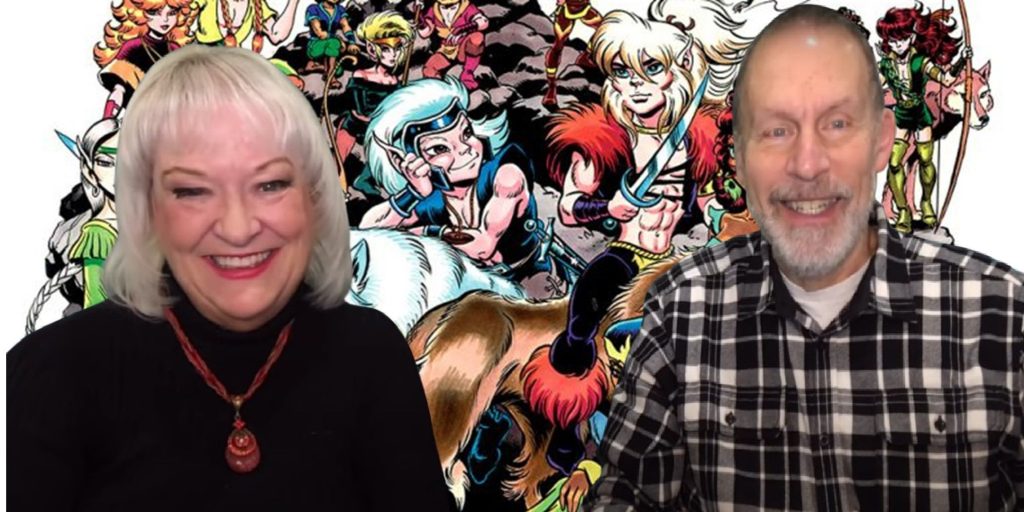In Comic Creators Speak, I occasionally talk with comic book creators about their work. This time around, I’m sharing a discussion that I had with Wendy Pini and Richard Pjni a while back about the history (and the future) of ElfQuest.
Back in 2023, when CBR was still doing the Dynamic Duos podcast, one of our guest pairs was Wendy Pini and Richard Pini, the creators of the iconic comic book series, ElfQuest, who were, at the time, celebrating Dark Horse’s collection of the most recent ElfQuest series, Stargazer’s Hunt. It was a really entertaining and informative interview, and, amusingly, it was RIGHT before we learned the news of ElfQuest actually finally getting an animated adaptation!
Since the Dynamic Duos podcast no longer exists, I thought it was a shame to let such a nice interview sort of “disappear,” as it were, so I asked CBR for permission to post the transcript of the discussion, and here it is, a discussion that lasted nearly two hours.
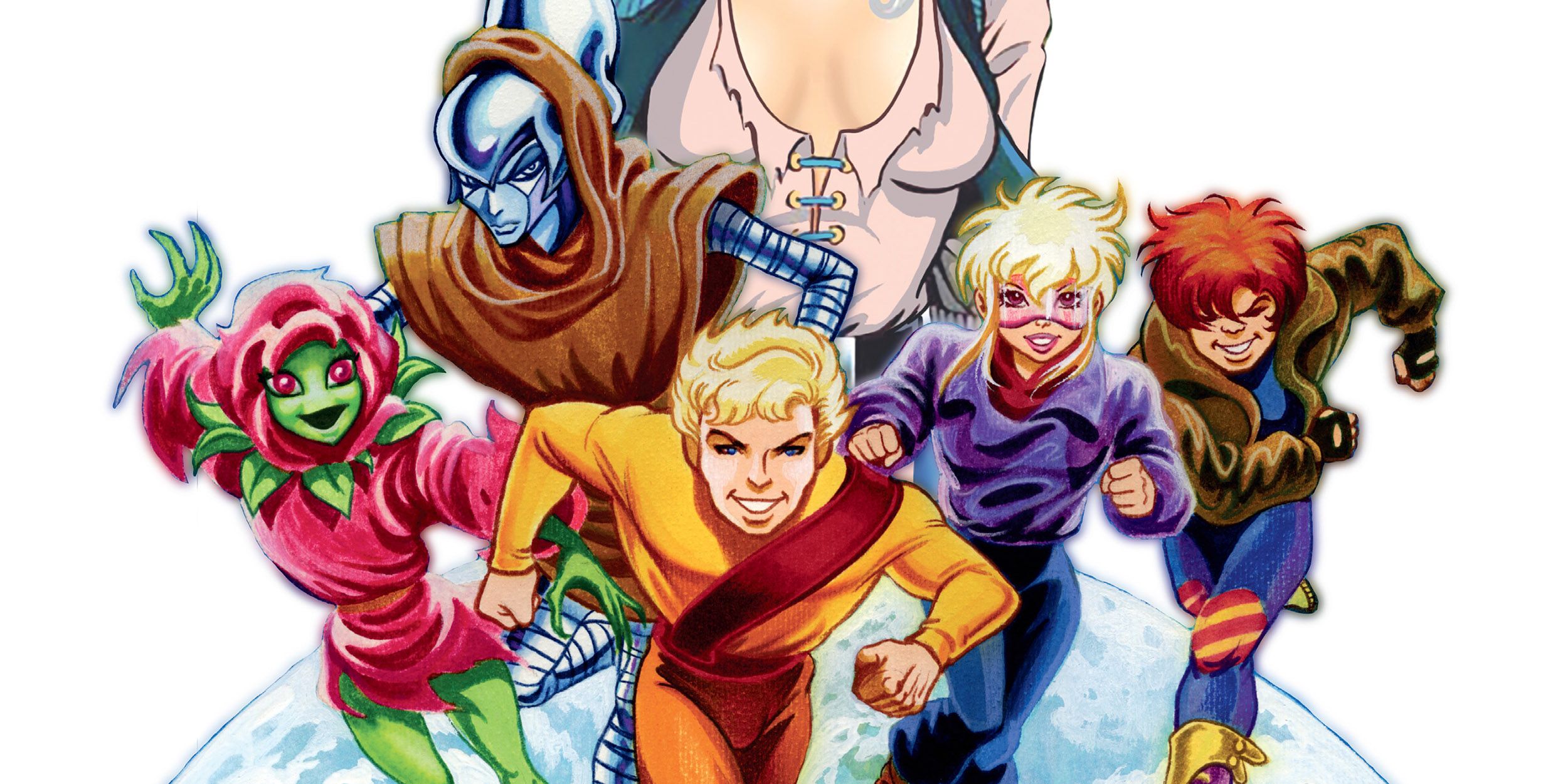
Related
EXCLUSIVE: Dark Horse Announces Final Elfquest Omnibus Collection
Wendy and Richard Pini’s ElfQuest will receive a final omnibus collection, released by Dark Horse early next year.
Welcome to CBRs Dynamic Duos, where we interview dynamic duos of pop culture. Our Dynamic Duo today is Wendy Pini and Richard Pini, the creators of the long-running iconic series, ElfQuest. Welcome to you both!
Wendy Pini and Richard Pini: Welcome to you, Brian. Glad to be here
In 1965, comic books started getting into the mainstream due to being read by college students, and the mainstream media started writing about comics, wondering, why are college students and adults reading comic books at that point? Any time a little mystery like that comes up, conspiracy theories follow. And so people were concerned that maybe people were trying to get addresses of little kids via comic book pen pal lists. So the Comics Code actually came in and asked every company to please stop publishing addresses of the fans that were writing in. DC Comics agreed. Archie agreed. However, the only one who wouldn’t agree was Marvel Comics.
Richard Pini: Oh, wow.
Wendy Pini: Thank goodness!
RP: That’s something we never knew.
And of course, naturally, that became a rather important fact when Wendy wrote a wonderful letter to Silver Surfer speaking about the humanity that she felt was lacking in the then-current Silver Surfer series at the time. So I’d just like to hear both of your perspectives, Wendy, how many letters you must have gotten in response to that? And Richard, just how did you react to that letter?
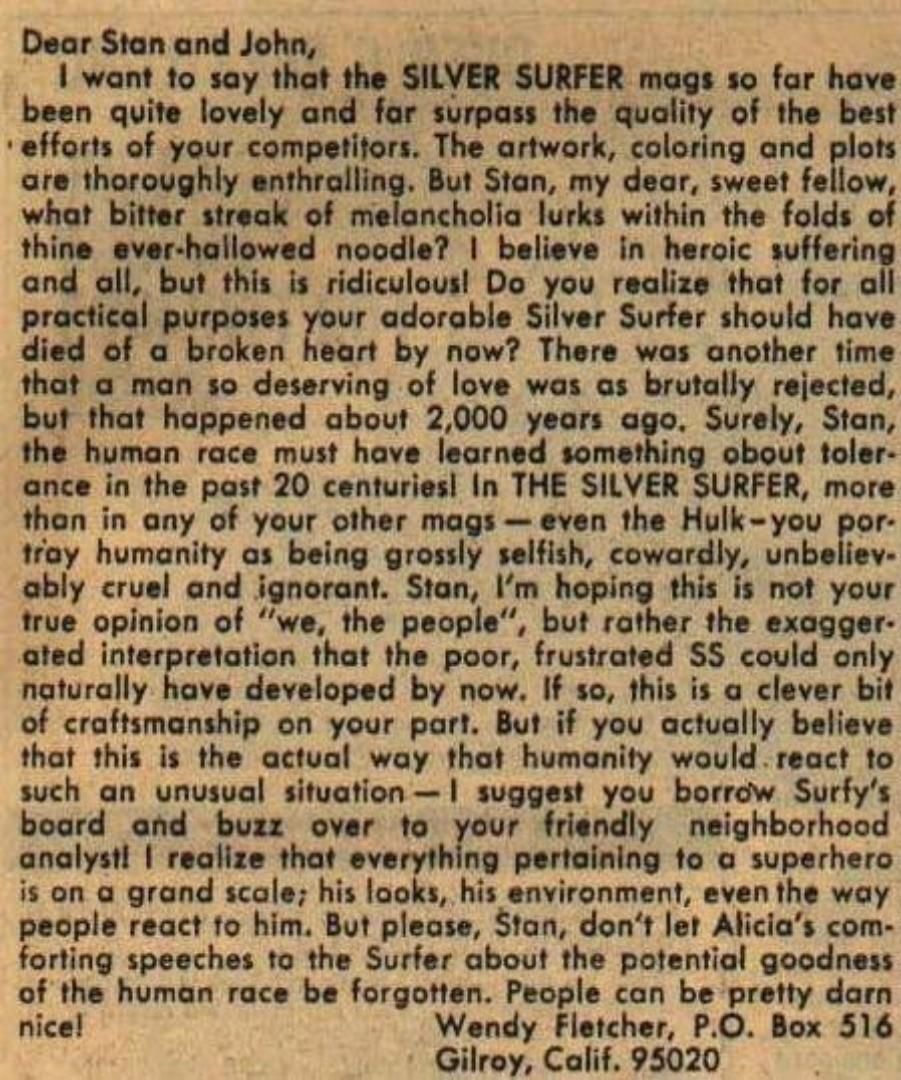
WP: I got dozens of letters from guys who wanted to meet a girl who read comics, because back then there were about three and there was one that intrigued me, especially one that I answered.
RP: See, I never knew what you just revealed, because at the time, it would have been very early 1969, so I would have been 18. I was in my Feshman year at college, and I was a Marvel Zombie long before that term of art ever got invented. So I didn’t see letters columns in other companies. I didn’t see them in DC Comics, and I knew that letters to Marvel had the addresses attached. So there I am, and I’m reading this issue of Silver Surfer, issue number five, and in the back there were a number of letters, and it was one that struck me for two reasons. One, it was quite philosophical in nature. It was wondering about, as you just said, you know, about humankind’s inhumanity to this alien beset-upon figure and two, it was written by a girl, and I suppose I was like any one of those dozens of other guys who wrote, but I was also honestly intrigued by a letter that didn’t wonder who was stronger, Thor or the Hulk or the Thing. So there was the address. I sent off a letter.
WP: And what he did to intrigue me was he was the only one who said, I really liked what you had to say in your Silver Surfer letter. But if you want to know more about me, you have to write to me, and I promise you surprises await, so he knew what to say to intrigue a young girl.
RP: I knew nothing about comic book marketing back then, but I guess I must have known something instinctively, because she wrote back. And not only did she write back, but she sent a drawing that she had done, a full-color drawing, not a sketch, a fully rendered drawing of Triton, the character from the Inhumans. And I was just gobsmacked by the fact, not only did she write back, but she was clearly a very, very good artist, and it’s only gotten better since.
That’s great.
RP: So we had a correspondence that lasted four years, and then we decided enough is enough. Let’s get together. We got married in 1972 and just a few years later, gave birth to this thing that has lasted 45 years.
That’s right. Happy belated anniversary! 50 years! Amazing. So it’s interesting that then, a few years later, people were still fascinated that people read comic books as adults. And that leads to the syndicated talk show, The Mike Douglas Show, doing an episode about adults reading comic books, and brought Phil Seuling, the great direct market distributor, on with Jamie Farr from M*A*S*H, who was a big comic fan as a kid, and, of course, as the big surprise, they had Wendy show up as Red Sonja! Do you remember anything about that recording of that episode?
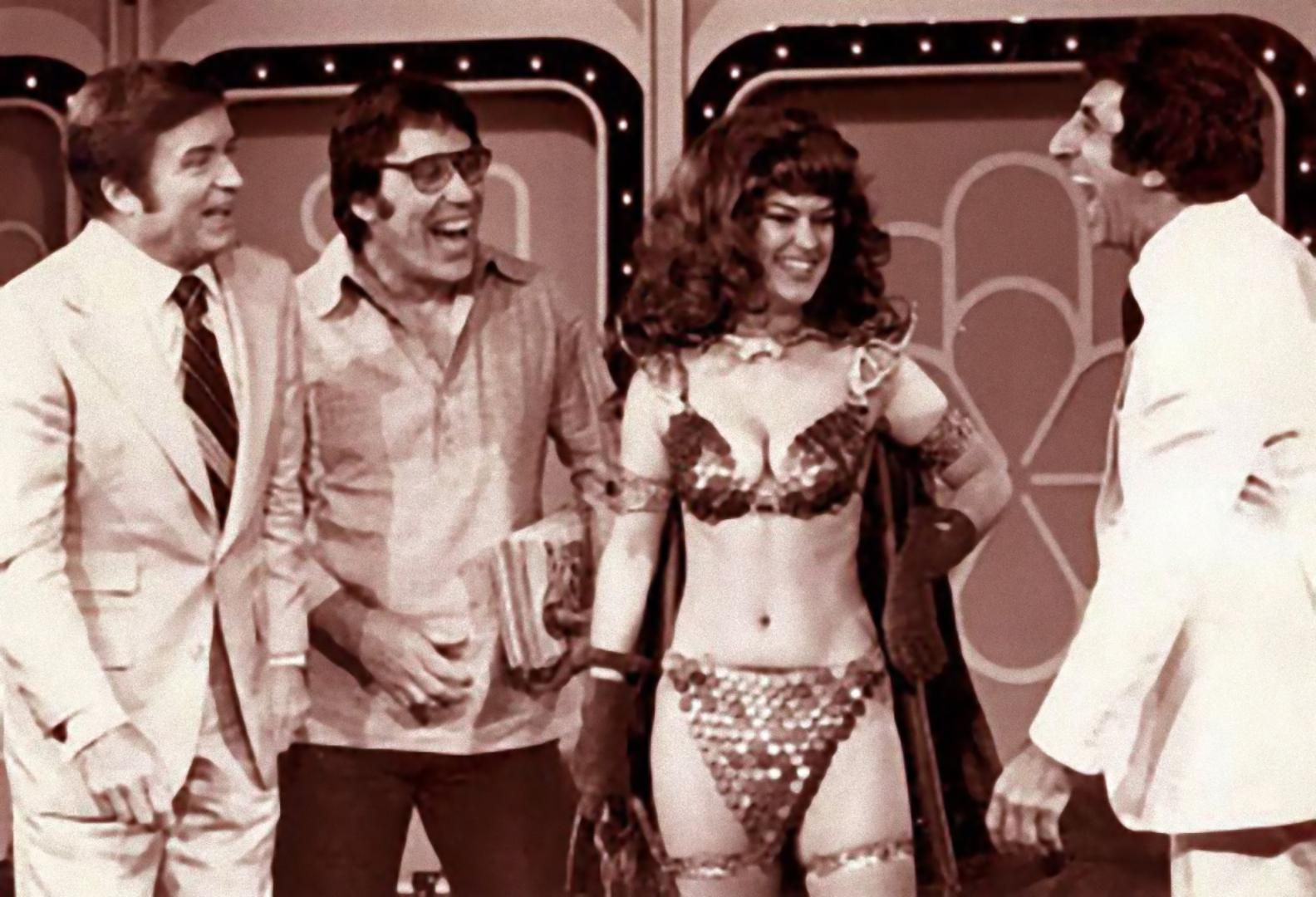
WP: Oh, plenty. Actually, Phil tricked Mike Douglas by telling him that it was going to be a superhero. Mike Douglas was expecting Captain America, so when I came storming out of the green room door onto the stage, Mike Douglas was very shocked, and he was apparently really disturbed that my lack of full costume might offend his more conservative audience, but the cameramen loved it, and Jamie Farr loved it, so it was tremendous fun. And one of my favorite stories is that a couple of years ago, we went to a small horror convention in New Jersey, and Jamie Farr was one of the guests.
Oh, wow.
WP: And we brought a photo of Jamie and me and Phil and Mike Douglas, and I held it up to Jamie, and I said, “Do you remember this?” And he went, “Oh, sure, I do.” And then I said, “That’s me.” He said, “You were Red Sonja?” He asked me for my autograph, and I asked him for his autograph. It was a lot of fun.
That’s great. So, speaking of Phil Seuling on the show, he obviously must have played a pretty major role in the history of ElfQuest, right?
RP: He certainly did. As many, if not all of your listeners will, or should, know, back in the early 1970s Phil Seuling was one of the major movers and shakers in getting the direct market up and running, which is the seed from all from which all comic shops direct shops now sprung, and how we began ElfQuest. We were working on it in 1977, and we didn’t publish that first issue ourselves. We had a small, independent publisher do the first issues, called Fantasy Quarterly #1. And as it turns out, one and only. But we knew Phil and Bud Plant, who was the other of the two pioneer distributors for the direct market in those days.
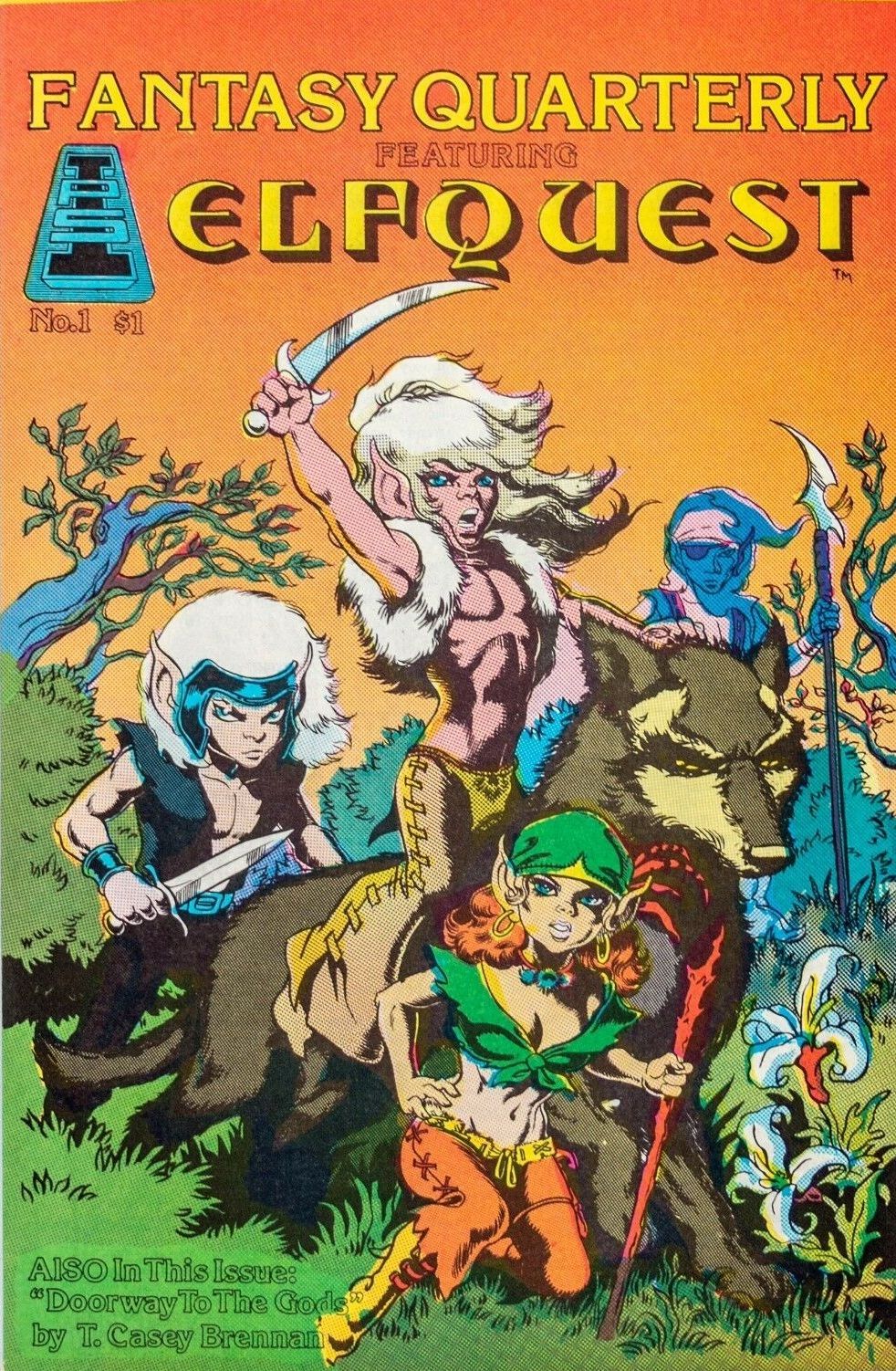
WP: The reason they knew us was because they were familiar with my career as a science fiction and fantasy illustrator that had been going on for some years prior to this. So they knew I had a reputation. They knew that my work was known, and so it was easy for them to take a chance on it.
RP: We approached them both and said, “This comic book is coming out that we’ve created, and Wendy has written and drawn. Would you be interested in distributing it?” And on the strength of what Wendy just said, they took the entire first print run, which was 10,000 copies, which was, for an independent comic back in those days, amazingly huge.
WP: We didn’t know what we were doing,
RP: And it sold out within a month or two. And that was so encouraging and so financially rewarding that we were able to go on and then begin self-publishing with our own company, WaRP Graphics. So we put out the second and third, and the numbers just kept rising and rising and rising, and it was a very heady time, but it’s why we’re still here 45 years later.
Regarding Fantasy Quarterly #1, one of the backup stories was by Dave Sim, right?
RP: Yes, in one of the coincidences of independent comics publishing, Dave was at the same time launching his title, Cerebus, and we had no idea he was doing that. He had no idea we were doing ElfQuest. But it is of cosmic irony that the very first appearance of ElfQuest does contain in the center, not a Cerebuss story, but a story that was illustrated by Dave Sim. So it was our first, and only, double date, if you want to call it that.
So at that time, Richard, how did you figure out how to become a comic book publisher? There was no How-To Guide at the time.
RP: There ws no How-To Guide, and we had no idea, We just knew that we wanted to get the story out there. It was an intriguing story. Wendy told the basics of it to me about a year before we began working on it. I said, this is really intriguing. Plus you habet to remember, this is 1977, and in 1977, Star Wars came out, and suddenly science fiction, fantasy and, by association, comics were really, not only just acceptable, but potentially really profitable to do. Wendy has been a storyteller all her life, and so we thought, Geez, maybe the climate has changed just enough so that we might have a shot not knowing a thing about it. All I could do was go to the Yellow Pages.
Oh, really?
RP: You know, the real thick book, the Yellow Pages, with a copy of Bud Plant’s First Kingdom, and Mike Friedrich’s Star*Reach. And I looked up printers, and I went to printers locally, and I said, “Can you do this?” And the others said yes or no, and the ones that said yes, I worked with. So Wendy did the art, and we would take the pages, usually at five o’clock in the morning, to the printer, and a little while later, there would be 10 or 20 or 40,000 copies bound up in covers. And we knew Bud and Phil, so we had distribution, and that’s how I became a publisher. It was like The Little Red Hen – do it yourself, or don’t do it at all.
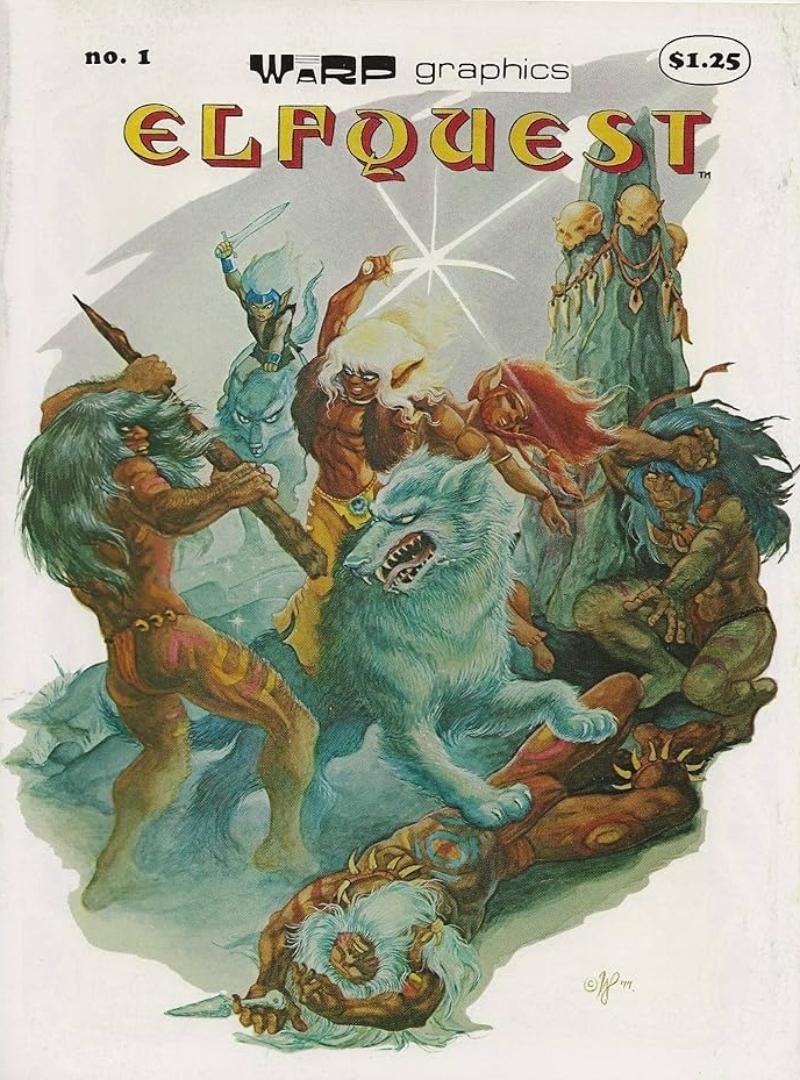
What’s amazing is that around 1977, there was also that brief Tolkien push for Marvel and DC, where they started doing lot of comics in that vein. However, for whatever reason, they didn’t seem to go for ElfQuest. Why do you think Marvel and DC weren’t interested in ElfQuest? It seemed that they just passed up this huge opportunity.
WP: I think primarily because of the drawing style, because ElfQuest, we like to say, and others say too, is known as the first “American manga. ElfQuest was the first comic published in America to really show an influence from Japanese comics and anime. I had been kind of America’s first Raging Otaku since I was 10 years old. I discovered anime through a film by Osamu Tezuka called Alakazam the Great. I was 10 years old when I saw it, and it completely changed my idea of how to draw, and I began to draw like that, and I began to look for any material that was from Japan. I got really interested in Japanese culture, and so when the opportunity to do ElfQuest arose, it seemed like a natural fit to draw these fantasy characters with large eyes and all the hair, which is the way most anime characters look. You know, it was just a natural fit. But I was also strongly influenced by Jack Kirby.
I was thinking of Kirby when Richard mentioned you drawing him a picture of Triton. I was just about to say that you have that beautiful melding of the manga and the Jack Kirby.
WP: That’s exactly right. And so, even though there was influence from traditional mainstream comics in my work, it was too strange looking for Marvel or DC to be interested in it. They called it peculiar, too peculiar for us to risk.
RP: The reason we went to Marvel and DC at all is that I didn’t want to be a publisher. I didn’t know how to be a publisher, but when they turned it down, and Mike Friedrich and Bud Plant also turned it down, the only real viable avenue left was to learn how to do it ourselves,
WP: And it was a learning curve for me too, in how to tell the story sequentially. Camera angles, layouts, again, I used my influences from Japan, particularly Osamu Tezuka, for how to lay out a page, how to bring the drama out in a quiet scene, and how to put the maximum movement and excitement into an action scene. It just seemed to click with readers at the time. We sort of caught lightning in a bottle. ElfQuest filled a need that existed at the time. And one of the things we’re most proud of is that we brought in a large female audience, which no other comic at the time had done.
RP: One of the things that I think we’re also proudest of, as Wendy said, to use the phrase, and we have heard it from other sources, is that ElfQuest was the first American homegrown manga, and I did a little research and discovered that this was at least 20 years before the manga craze right hit these shores, as it was around 2000 that American artists started doing actual Manga comics. But we were there 20 years earlier.
WP: I know in the early 2000s that you started to see Japanese influence in mainstream comic artists working in superheroes. You started to see a more edgy, and angular feel, and more attention to line work and the layouts became different, as well. It’s exciting. I mean, you know, the Japanese, in some ways, have it all over us, as far as exciting ways to tell a story in comics.
What’s interesting is that early in the 80s, as you say, when you hit that nerve, as it were, you also had the fandom, the ones who loved to dress up like ElfQuest characters. And I just wonder if you think that your background doing cosplay in the 70s had any impact on the way your designs just seem to be so well realized, as it’s clearly outfits that someone could actually wear.
WP: Well, thank you for saying that. Actually, as a costume designer, I have been doing costuming since I was about 16 years old, because I started out in sci-fi and fantasy fandom and attending science fiction conventions and exhibiting my art, but I was also very active in the Masquerade. The word cosplay didn’t exist until many years later, but we called it costuming, or masquerading, and I had been doing it since I was about 16 years old. So when it came time to design the characters for ElfQuest, it was something that I had already been doing for many years prior in the characters that I designed for my covers and interior illustrations for Galaxy and if they were all science fiction or fantasy and the way a character looked, the way they wore their clothes, was always pretty essential to me.
Well, it definitely translated to the ElfQuest characters.
WP: And yes, the fans did pick up on it, and they did seem to find the costume designs pretty easy to duplicate.
RP: That had its expression, of course, in 1981 at San Diego at the Comic Con. I like to think of that as the Year of the Elf at San Diego, because they have, since the very beginning, had an amazing masquerade, usually on Saturday night, and people put together wonderfully intricate costumes, or now cosplays. But in 1981, ElfQuest had been going for about three years, I think we were nine or 10 issues in. And that year, at the costume competition, two groups of fans showed up. One of them was about 50 or 60 strong. The other one was smaller, maybe 30, all dressed up as ElfQuest characters. They completely commandeered the stage, and it was amazing for us, sitting in the front row in the audience.
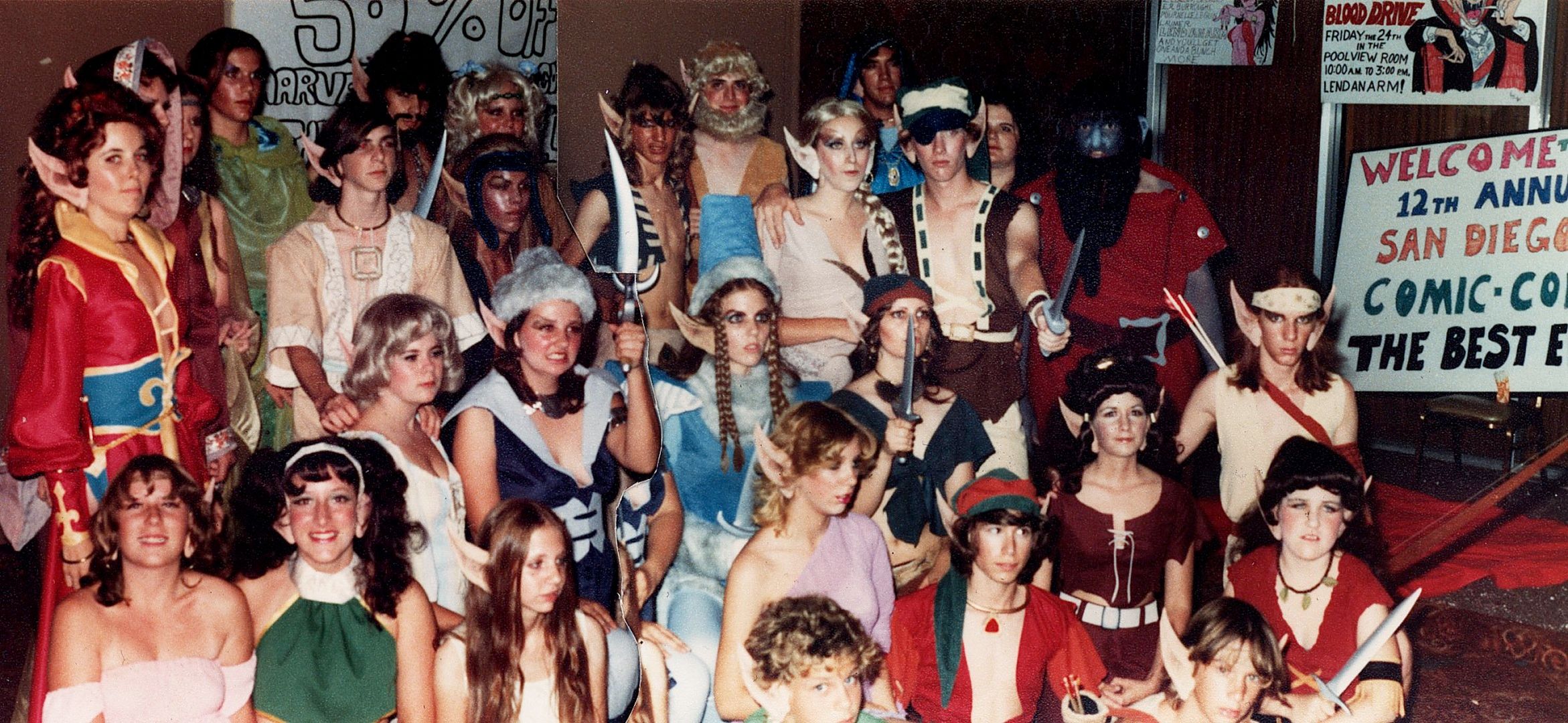
Do you remember the FIRST time you saw an ElfQuest cosplay?
WP: Oh my goodness, it’s possible someone sent us a photo. I really don’t remember. I just know that the strongest memory I have is of 1981 where you couldn’t. even turn and look anywhere without seeing an elf. It was tremendous.
RP: As ElfQuest became more and more well known, we got invited to more and more conventions, large ones and small ones. And I’d be willing to bet some money that before that Comic Con in 81 we had been in maybe 79 or 80 to a local or regional show, and somebody would have shown up in the costume, and, of course, cosplay, and we would have been as thrilled to see that as we were in San Diego.
WP: Here’s the point, though, some of the best feedback you can get as a creator is when the fans show your characters back to you, and when you see that not only do they get it, but that they can incorporate it into their own persona and their own creativity, and that never, ever, ever gets old. We never get tired of seeing wonderful costumers portraying our characters. So some of the ones from Europe, Russia and the northern Scandinavian countries, are just unbelievable. But I think we’ve always had a great relationship with those fans because elfin folklore just permeates Europe and parts of Asia.
That early fandom has got to be amazing, because nowadays, we’re so used to the idea of instant feedback, social media will have an answer to the issue the moment an issue comes out. Instantly, you’ll have people on Reddit or Facebook or whatever, while in 1979/1980, people would have to send you a letter with postage stamps to give their opinions. And that’s why I just wonder about the first cosplay, because it’s that tangible response. “We’re putting this out there.” And you now know, the impact is there. It’s got to be an amazing feeling.
WP: Well, you know, costuming as your favorite character was nothing new to us. We were part of Tom Fagan’s famous Halloween parade in Rutland, Vermont as the Vision and Crystal. So we knew about portraying a character that you loved. So when we saw fans starting to portray our characters, it was kind of like, my gosh, you know, we used to do this when we were fans, and now we have fans doing this for us. It’s really kind of a full circle experience.
RP: And it’s funny, you mentioned snail mail, because it’s true. Back in the day, ElfQuest only came out three times a year, so there were four months between issues, and that is an eternity in the digital age. But we were all used to the notion that you put an issue out, and over that period of three to four months, we would get dozens, sometimes hundreds, of handwritten or typewritten letters in envelopes with stamps on them, and it was a continuous, not instant and not flooding, but a continuous intravenous drip of feedback that was very, very nourishing. And what I’m finding more so in the last year or two than in the past couple of decades, people are starting to write letters again. I don’t know any other comics, but they’re starting to write letters into us about ElfQuest, and that is just so incredibly gratifying.
WP: Yeah, it’s charming. It’s nostalgic to see handwritten fan letters, with little drawings and things like that, and it really takes us back to our earliest days. It’s like you said, if you take the time to do this, it takes nothing to, you know, click “Like” anymore, but if you take the time to handwrite a letter. There’s a contract there. There’s a relationship, even though it’s very, very indirect.
RP: Well, I think this says something about ElfQuest fandom. Over the years, we have really paid attention to the nature of our fans, and it’s quite different from other kinds of fandom. The people who are attracted to ElfQuest tend to be marginalized in some way. We have a really large LGBTQ+ audience. We have a really large, neurodivergent audience. We have, again, as I said, lots of women readers and women have always experienced being marginalized. So what happens is that they find themselves in the story and in our characters in a way that I think a lot of other comic fans don’t necessarily relate to the comics they like. ElfQuest is very personal to a lot of people, and I think when something’s personal to you, and you want to communicate with the creator, maybe writing a letter by hand is a more personal way of reaching out. So I think handwritten letters is kind of expressive of what kind of fans we have.
And I guess as an independent title too, it almost felt like that there’s a greater sense of, not OWNERSHIP, but community, I guess you would say.
RP: Well, yeah, that’s a very important word to us, because for all of ElfQuest‘s 45 and counting years, community is one of the pillars of the story of ElfQuest, the tribe, the different groups, the different families. And as Wendy said, a lot of our fans just find some sort of identity or comfort, if you will, in the story. So we are always aware of trying to build community between us and our readers.
WP: But to be honest, that’s not something we actively had to do. The ElfQuest community group grew on its own, and quite a few of our fans have been with us from the very beginning, and they’re still with us, but we’re getting newer readers all the time. And one of the things that Richard did, that I just think was the greatest idea, was, at a certain point in the mid-2000s he started the project of putting just about every page of ElfQuest online to read for free, so that new readers could discover it and catch up on the story without having to scramble to find the various comics online. And it gained us a whole new readership. I think particularly of younger readers, and that’s something we’re always looking for.
RP: Well, that also came about because Marvel and DC were starting to sell comics online. This was the beginning of, you know, the monetization and micro-payments and whatever, and it has always been much more important to me as a co-creator and as a publisher that we have more new readers than that. We make a couple dollars, right? And so there’s about, I don’t know, eight or 10,000 pages that I had to scan from, from, it took a year and a half to do this, but all of that stuff is on there, and you can read it. And I’ve loved that people give us feedback, and thank us for putting that on there. “I didn’t know where to start.”” I didn’t know if I could find the back issues.” Some of them are very expensive, but we let then read it, and now they want more.
WP: Even now on the ElfQuest fan page, we get newbies who say, “Hi, I just discovered ElfQuest. And I don’t know where to start. How can I catch up on the story?” And it’s so much fun to tell them. Well, you can go right here to ElfQuest.com and very often they will come back and say,” Oh my god, I had no idea!” We just love new readers who come up to us at conventions and say, “I only just started this story, and it’s amazing. Where has it been all my life?” And we say it’s been here for 45 years. But welcome to the tribe!
What I love about the setup on ElfQquest.com with the readers is, not only are the issues there, but as you note, there’s even a guide. These are the ones you might want to start with, and maybe these here are more “extra.” That’s a really nice help for new readers.
RP: Well, that that was a very conscious decision, because over the years, we have, as I said, published, lord, 30 or 40 collections of books and hundreds of comics, and there is a skeleton, a core story that involves the Wolf Riders, that starts at the very beginning and has a direct through line to conclusions, but we took many side trips, and we had some spin off titles, and we’ve tried to make it as easy as possible for somebody who’s new to get the basics and then discover the “side dishes,” if you will, from the main course.
1:52
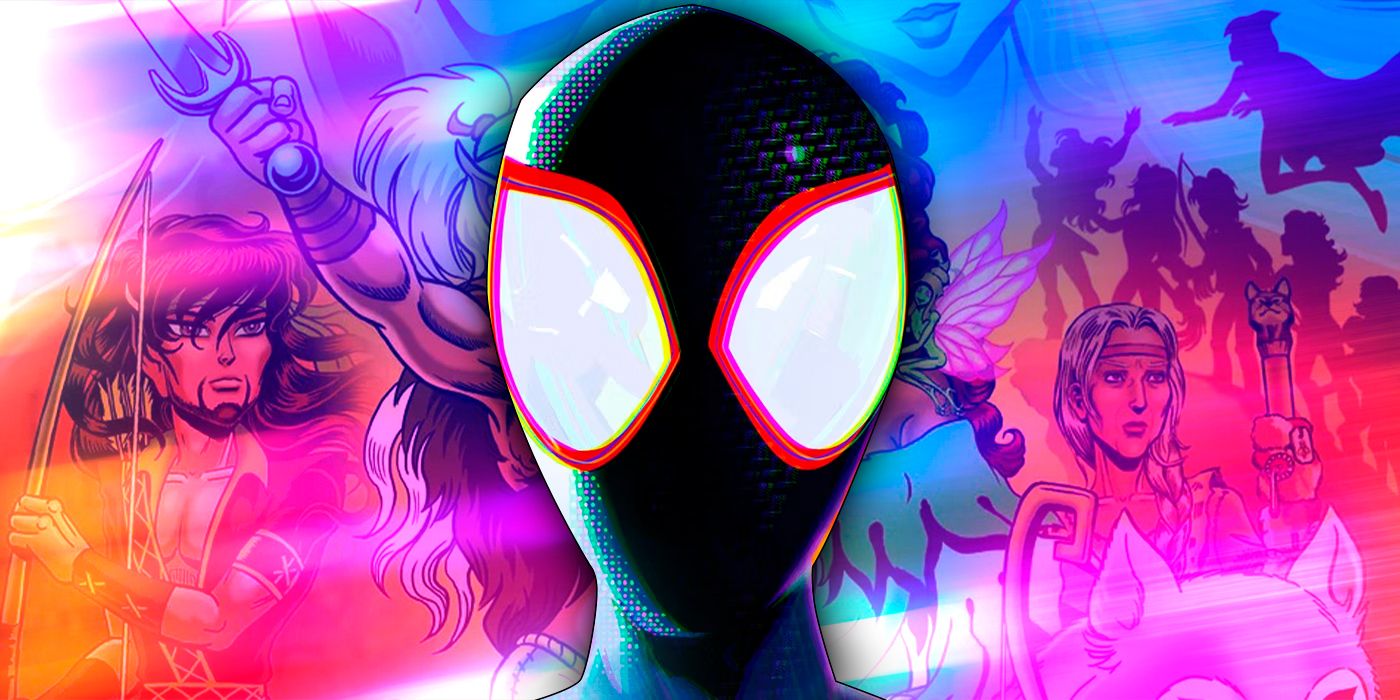
Related
The ElfQuest TV Series Can Thrive In a Post Spider-Verse World
ElfQuest is finally getting an animated series, and the show will likely use the example of Into the Spider-Verse to revolutionize animation.
What’s interesting is, when you described the concept of ElfQuest to Richard originally, Wendy, you had a beginning, middle, and end in mind, right?
WP: Yes, pretty much. It was more like a skeleton. All the side trips that we took on the ribs of the skeleton came as we developed the story along. But I just I had an idea about a persecuted tribe of fantasy characters who look like elves, who want to find out what their origins really were, where they really came from and where they really belong, and the character that we brought forth to be the exponent of all that was Cutter, the leader of the Wolf Riders, and ElfQuest, the 45-year arc of ElfQuest, right through to the end of Final Quest is his hero’s journey, and boy does he succeed! Boy, does he manage to answer the questions they all had at the beginning of the story!
I guess that brings us to the topic that a lot of people ask, which is – We have a “Final Quest,” but when I hear that, anyone who’s been reading genre comics knows that “final” usually means just for that specific story, right?
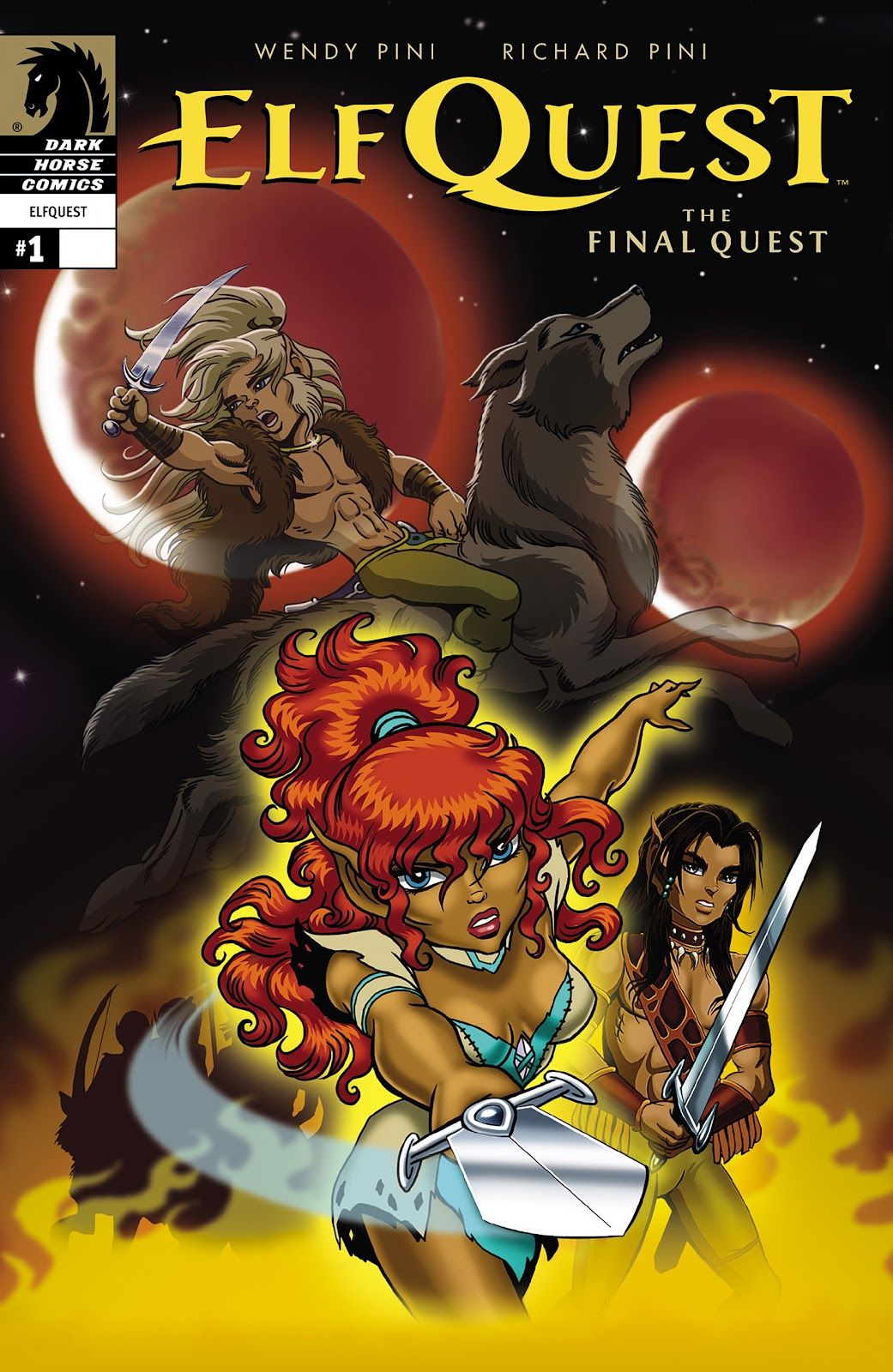
WP: Well, in our case, final does mean final in the sense that in comics, unfortunately, comic fans these days take it for granted that if a character dies, he’s going to get revived, he or she is going to come back. So they never take it seriously, and they never get to feel what really happens in the story, because the character dies and they go, “Oh, that’s sweet, but you know, they’ll be back.” In ElfQuest, that’s not so. When we bump off a character, they stay bumped off. And so we plan these things incredibly carefully. And Final Quest really was the final appearance of a number of characters,
A NUMBER of characters, yes.
WP: And that is why we really felt it extremely important to bring out a coda to the story called Stargazers Hunt, because the two main characters of ElfQuest are Cutter and Skywise. And Cutter is my elf and Skywise is Richard’s elf. And so, at the end of Final Quest, Skywise is left without Cutter. And there were many, many questions in people’s minds about what happens to Skywise.
RP: Not only that, there were questions in readers’ minds, but there were questions in SKYWISE’s mind, as well! His companion, his best friend, his soulmate, is no longer with him, and he has questions that he never got to ask, so he never got answers to. And even though the hero’s arc of Cutter, chief of the Wolf Riders, was known from the very beginning, the notion that there needed to be, as Wendy calls it, a coda, an epilogue, so that Skywise could answer or find answers to those questions became of paramount importance once Final Quest was done in 2018, 40 years to the day. We sat down with Dark Horse, our publisher, and said, “Hey, ‘final’ may sound very dire, but wait, there’s more!” And that’s how Stargazer’s Hunt was born. And the story of Stargazers Hunt was full of potholes because it was conceived as an eight-issue miniseries.
WP: And it got started in 2019, very soon (probably TOO soon) after I finished Final Quest, I was totally burnt out from Final Quest, and here comes this new assignment.
RP: But, you know, you can’t stop the story. So Wendy and I did the story, and Wendy and Sonny Strait, who is not her assistant, but…what word would you like to describe him?
WP: Sonny Strait is far more than my assistant. He started as my apprentice back in 2001, and he has been with us on this journey of finishing the heroes’ journey, and Sonny, my gosh, he wears so many different hats when we work together. He likes to say that he’s my finisher, because I will send him pages in different conditions. Sometimes he’ll get full pencils. Sometimes he’ll simply get a rough layout. And whatever condition the page is in, he will bring it to full finish, including colors.
RP: So in 2019, the three of us started in on Stargazer’s Hunt, and the first three issues came out, bi-monthly, I believe it was, and that takes us to February/March of 2020.
Yikes.
RP: And suddenly, the cosmos goes boom and shuts down the world. Issue #4 had already been delivered. It came out months and months late. Issues #5-8 never got to see life as individual floppy comic book issues. Dark Horse worked with us to bring out two softcover elections for the issues, each of which were really, really nice, but the story and all the hard work, uh, really wanted expression, so we and Dark Horse worked together, because 2023 is our 10th anniversary with Dark Horse. So everybody really worked hard and pulled together to come out with this gorgeous hardcover edition of the entire story with extras and all sorts of goodies inside. It’s available from Dark Horse. It’s available at Barnes and Noble and Amazon, and wherever.
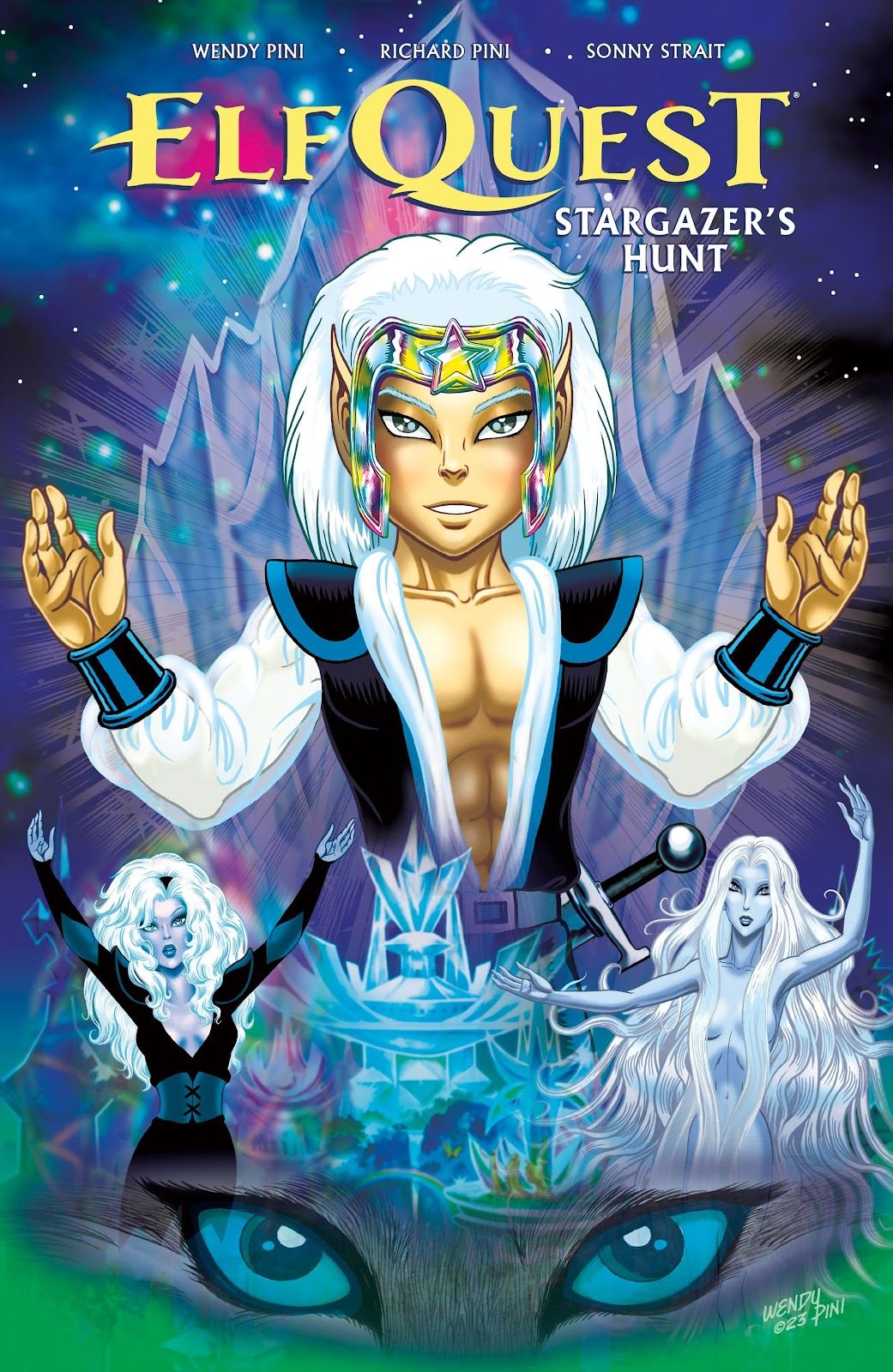
WP: Do you want some inside dirt?
Oh, of course.
WP: Okay, the inside dirt is – you were asking, is final really final? There are so many clues and hints of stories.
RP: Just as over the last 30 years of ElfQuest, there were clues in those early stories. Because we, mostly Wendy, because she keeps all this stuff and I don’t, I’ll never know. I don’t even know if SHE knew the groundwork that needed to be laid down because stuff was going to happen in Stargazers Hunt and Final Quest. And she loves dropping clues so that years later, we can go back and say, “Oh, you think we’re making this stuff up on the run? Well, what happened here? Go back to issue #3 in 1980 and look at panel six on page 12.”
WP: Yeah, we are our wonderful social media wizard, David Mizejewski, he just loves to do that, every once in a while, to post a page and say, “Hey, you know, look here, see how this relates to what happened 20 years later?”
I loved that about the original series. I loved how you had this whole thing mapped out so far in advance that I remember there’d be clues in the oddest places. I remember there was, what a cover for some, maybe not Comics Journal, but something like that that references issue like three, four years later.
WP: Absolutely, yeah.
RP: Actually, I think I know what you’re talking about. Is that the blue one with Skywise and Timmain?
WP: Yes, that was a Comics Journal.
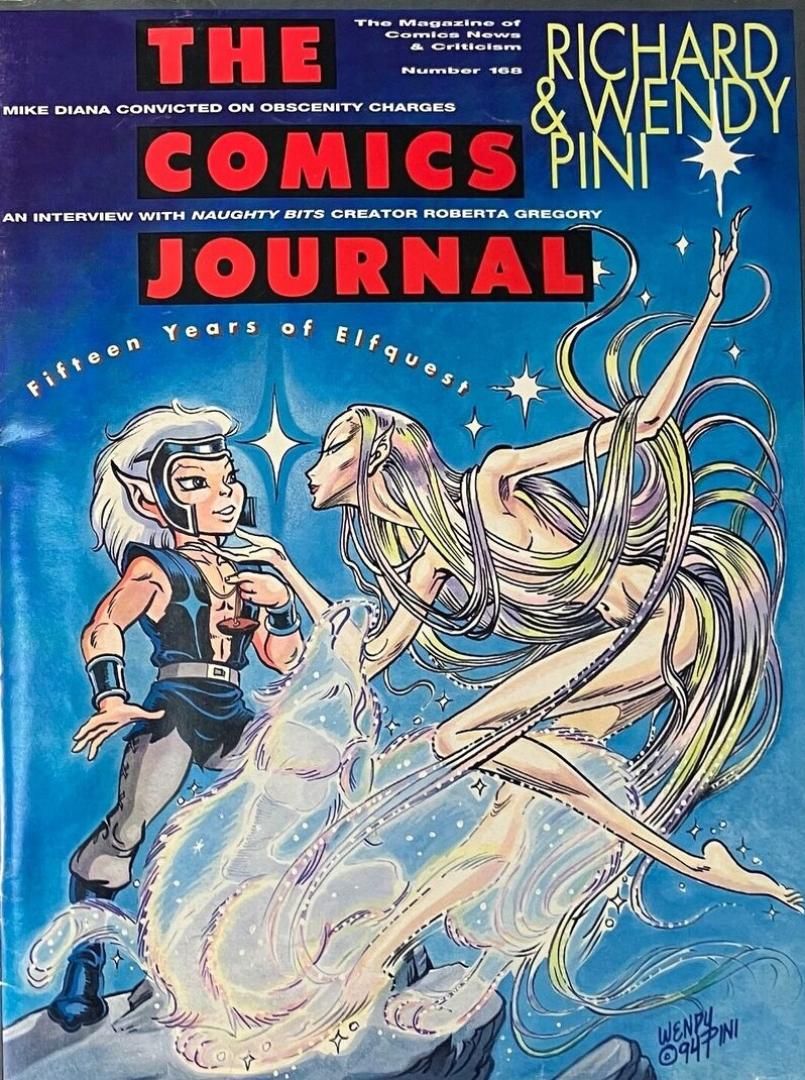
RP: Okay, yeah, yeah, we hinted at that possible romance over 20 years before it happened.
I also loved when you had the original books, because you had your letter column that was so important back then. I mean, all letter columns were more important back then. But what I loved was you’d have the fans constantly guessing what would happen.
RP: Yes, well, because ElfQuest is a more or less self-contained story, and more or less a linear story and universe, we were able to keep track better of where the story was going, even though we took side trips. When you have a huge universe like Marvel or DC, and you’ve got multiverses and, you know, Earth 5270 or 5646 million, we never had that. We had 700-800 characters, but even that was manageable by comparison, so we could drop hints for future stories, and the fans would be able to follow that from the previous stories through the present story. And we also decided to give a lot of space to the letters as they came in, because, as I said earlier, people would write, and they would write three, four, five-page letters, and we just wanted to share those thoughts with others and keep that creative feedback loop going.
WP: And he’s lust a hideous tease, just in real life. So he loved to tease them. You know, he would print someone’s speculation, and he would just spin an answer to them, which would be completely false and misleading.
RP: But I would love to make it sound so reasonable. You know that you THOUGHT you were going to get in the next issue? No, no.
What I love about the current Stargazer’s Hunt is that we get to see Skywise, as you say, we’ve had the hero’s journey of Cutter. Now Skywise has his hero’s journey. And it’s strange when you get Sancho being the star of the story, that self-doubt is such a major part of Skywise’s story, and it’s so insightful. And as you say, Skywise is more Richard, but you’ve been writing him for 45 years now. Do you feel you know Skywise as well as Richard by now?
WP: That’s a brilliant question, because I had to rely on Richard for this so much. Richard’s contribution to this is enormous. We had an outline, we had a treatment, but at every step of the way I had to ask him so many questions. I was constantly asking him, “What would Skywise do here?” How did he say it? I know everything about Cutter, because Cutter speaks for me, but what Skywise thinks deep in his heart doesn’t always come to me naturally, and I might write something in a certain way that conveys the idea, but it took Richard to say it his way to make Skywise’s dialogue sound so natural. Here, Skywise is in a new role. He could always be Cutter’s sidekick. He could always riff off of Cutter and be the comic relief and all of that. Here he has to express himself more fully, but he still has to be Skywise. I think one of the symbolic things about the story in the artwork is that Skywise doesn’t always appear as the same size. Sometimes we see him in his traditional elfin Wolf Rider size, and then other times we see him as he transforms into a high one. He can do this at will now, but it’s interesting how he never quite stays either small or tall. He seems to vacillate, and that is part of what expresses his doubt about who he really is now.
RP: See, because in Stargazer’s Hunt, for the first time in his now immortal life, he’s on his own right in a way he’s never been. He’s been apart from Cutter at times, traveling or questing or kidnapped, but here he is completely on his own, and that’s just one of the facets of the arc he has to go through and to determine just how he feels about that and what he’s going to do with that. It’s its kind of funny, because this is a coda to Final Quest. It isn’t an epilogue. And Final Quest wrapped up now five years ago, and we still get responses, usually on social media, from people who say, “I bought Final Quest, but I haven’t been able to bring myself to read it, because I know what happens.” It’s five years, there’s no spoilers anymore,
WP: They just don’t want to face it.
RP: They just don’t want to face it. And we tell them that Stargazer’s Hunt exists, in part, not to wrap up, but to close a chapter in Skywise’s story to give him closure, but it’s also to comfort you and and allay your fears about Final Quest. So you really should read Final Quest and then crack into Stargazer’s Hunt, and I think it is kind of a powerful incentive to get people to read this story that they’re afraid to read.
WP: And when someone writes us, and says, “I can’t bear to read Final Quest,” we encourage them to, just as Richard says, to then go ahead and read Stargazer’s Hunt . Then we hear back, and they say, “Oh, I get it. Now it’s not the end of life. Life doesn’t end. It changes. It evolves, but, as Cutter’s spirit conveys in the story, it’s done, but it’s not finished. Nothing’s ever finished. And that’s pretty much ElfQuest. It’s done but it’s never finished.
RP: That’s why when we announced Final Quest, fans freaked out. “She said ‘Final’!” “What do you MEAN ‘Final’?” It doesn’t mean no more ElfQuest. It means a certain, very specific finality.
WP: Sonny Strait said something that I thought was really powerful. He said, “You know, we’re doing something very, very cheeky here, very daring. We’re actually attempting to tell a story about heaven, but with no theology.” You know, a lot of the story takes place on the Star Home, which is a kind of depiction of Paradise and the characters that live on the Star Home can exist in pure energy form, or they can exist in physical form. They can choose to be whatever they want to be, which is literally a vision of heaven where there’s no physical danger, where there’s no suffering, there’s no pain, there’s no hunger. Because you’ve evolved beyond the need for sheer survival, which was the Wolf Rider story to begin with. The story begins with the very basics of just having to survive in a world that’s out to kill you. And now the story has reached the point, where many of the elves have achieved their heaven, their Safe Home, the thing they were always looking for. But for Skywise, he’s still restless. He still wants more, and he still needs more.
An important part about Stargazer’s Hunt that people should understand is what is an amazing aspect, which is that with all this conflict, there’s only one being that dies in Stargazer’s Hunt, a bird. There’s no real violence.
WP: Well, someone, someone does fire a pistol. That’s about the extent of it.
And it’s so amazing that there’s all this conflict without that traditional idea of conflict.
WP: Thank you. Thank you for pointing that out.
RP: That is a very, very astute observation. One of the things that we, mostly Wendy, have tried to do in ElfQuest over all of its history, is to take tropes, things that are so commonplace and so often used as storytelling devices throughout literature, but in our case, throughout comics, to take these stereotypes and then just turn them on their head. All throughout ElfQuest, you’re going to see stuff like that in the very beginning. You know, in Cutter, you have Conan sweeping the slave girl up on his shoulder. So in the very first issues of ElfQuest, Cutter, you know, hauls Leetah up on his shoulders, and the minute he gets up on the hill, and he thinks they’re safe, she turns the tables on him 100%
WP: You have to show the bad behavior so you can show how it can be flipped on its head. But I think, just to get serious for a moment, in one of the most powerful examples of turning a trope on its head, is how Cutter finished his story, because some of our fans were shocked and horrified and said, “Oh, no, it can’t be like that. He has to go out in battle. He has to be swinging his sword!” No, we never, not from the very beginning, did we plan it that way. We wanted to show that we can’t choose how we exit the world. It’s not the dying, it’s how you meet it. And so he didn’t choose what happened to him. He didn’t want it, but it happened, and he faced it, and people get to see that whole beautiful process of acceptance, rather than, you know, going out with sword flashing and taking out as many people as you can with you, which is the Conan the Barbarian way of doing things. We had an entirely different idea of what happens to your hero when his journey ends. And we wanted to show that in all of its beauty. And most of our fans got it, and most of our fans were very moved by it, but I think it’s still taking some of them a struggle to accept that he didn’t go out like with his sword flashing like Zorro or something like that. It was far more beautiful than that. I hope you felt that way about it.
Well, the funny thing from my perspective is, not to knock Stargazer’s Hunt, which was a very nice story, as well, but I don’t think Final Quest had a sad ending. You mentioned people worrying about reading that last issue. It is not a sad ending. It’s bittersweet, but not sad. I would say.
WP: Thank you.
RP: We agree, but we have learned over the years that as many fans as we have, that’s how many different reactions we get whenever there’s a story or an event in a story that’s particularly powerful, and this is one of, if not the most powerful events in all of ElfQuest. And we have learned a thing ourselves. It’s easy to have the reaction as a creator when you’ve done a story and a lot of people react to it in a way that’s very gratifying, and some react to it differently. It’s very easy to have the reaction of, wait, wait, wait, what did you miss? Don’t you get it? What we have learned is that everybody’s reaction is different, and everybody’s reaction is valid for them, and we do our best. I hope, if somebody says, “I just can’t read it because I’m afraid to,” to say, we understand that, but give it a shot, because we think you will find it’s not so fearsome as you’re thinking right now.
WP: Going back to my Japanese anime and manga roots, since I was a young teenager, I have been reading stories about Japanese culture, where they don’t have the same fear of death that we Westerners do, and they have no trouble killing off characters right and left in their stories, even their most fmous heroes, you can pretty much expect them to go. Tezuka was like a cruel God. When he was done with a character, they were gone. So I grew up on that kind of story. I loved the gravitas. I loved that the stakes were so high in a story, because you never knew if a character was going to make it out of the story. And I wanted people reading ElfQuest to have that edge of their seat feeling like when we take a character out, they’re out. So I mean, what’s going to happen here? The first death we confronted our fans with was One-Eye, and not even we could face that very well.
RP: Well, there’s a whole long story there that I don’t know if we have time to go into. You tell us.
I’m here for as long as you want to be here.
RP: Okay, in the original outline of ElfQuest, you know, two thirds of the way through, the Wolf Riders were going to get involved in a major battle with some very nasty trolls. And in that battle, Wendy thought it was totally unrealistic that everybody made it out alive. So in that battle, the character of One-Eye gets conked on the head and falls down and is dead. And at that time, in my own evolution as a co-creator and story editor and, you know, helper, I was so invested emotionally in these characters that I just said, “No!” I don’t want to see any of them die. I like them all. Now I have to take another side. So she was going to kill Skywise very early in the series.
WP: That was my romantic side.
RP: And I stepped in and said, “No way, no way.” He’s an astronomer elf. I’m an astronomer by avocation. No, he lives! Anyway, One-Eye is dead, but I just couldn’t accept that. And we had some long, running, rollicking discussions about that, and came up with, I don’t think Wendy liked it very much, but I was okay with it. We came up with the idea that he was on death’s door, but we have this thing called wrapstuff, and if you’re cocooned in it, you go into suspended animation, time stops.
WP: But here’s why it made sense, and it made so much sense for the development of Leetah’s character, because Leetah, as a healer, had a total antipathy at the time, against death. She considered death her enemy, and as long as she had the power to save someone’s life, she was going to do it, even if it was a troll, and it was a hard lesson for her to learn that sometimes you just have to accept death as part of life. So she works. We have her in the story work and work and work to save One-Eye. And she keeps him from totally leaving his body. And then he gets put in suspended animation, and it’s terrible, right? It’s awful because he doesn’t get to die. He was ready, but he doesn’t get to go, and so later on in the story, we give him his freedom.
RP: But the thing is that had we not had that discussion between the two of us about my not being able to deal with him dying, if that hadn’t happened, then all of these wonderful explorations of death, of healers, of what it means to have this power, none of those would have evolved into the story. That’s why ElfQuest is so organic. We have the foundation, but sometimes we get to take some very, very interesting side trips that enrich the story tremendously.
WP: And another thing that we’re still excited about after all these years is the fact that we set limits on the characters’ powers. You know, Superman bothers me. I wouldn’t begin to know how to write a character like Superman. I just wouldn’t. But by having characters with powers that are limited, it works for me. Leetah is a healer, but there are some healings that not even she can achieve in the story. And there are all sorts of factors as to why. Redlance is a plant shaper, but his powers had to grow. They started out very small, and then he had to learn and gain control over what he could do and so on and so forth. With all our powered characters, the world of Two Moons itself puts a limit on the energies of these elves, and that’s why they struggle to survive and have to learn just the basic craft of survival and fighting for your life, and hunting and gathering and all those things, because they couldn’t just wave a wand and go poof and, you know, here’s dinner. This is not how we decided to use “magic” in our story, and magic in quotes, which is in a very limited way, so that our characters had to work for what they gained, and they had to evolve and grow out of what they learned. ElfQuest is about learning who you are and what you can do grows exponentially as you learn about who you are.
Well, I guess Skywise learns that…throughout Skywise’s story, there has always been that sense of, I don’t want to say “he runs away.”
WP: Yes! Yes!
I mean, he DOES run away, but “run away” sounds so pejorative.
WP: He’s an escaper.
“Escape.” There you go. He escapes, and he has to come to terms with that in Stargazer’s Hunt, to a great degree
RP: It is part of his DNA to have wanderlust. He is an explorer, and it is just fundamental to who he is. But he also has relationships that are very, very important, even to the point of necessity, to him. And how do you balance those two seemingly conflicting impulses? And sometimes one may predominate to the other, and that has a bad effect on the other.
WP: Well, this is where we get to examine the nature of love itself, because what we’ve learned over the years is that love allows even to the point of letting go. You know that old trope about how, if you love something, set it free, and if it comes back to you, it’s yours. We don’t even take it that far. If you love something, just set it free. Whether it comes back or not, you don’t even worry about that.
RP: Yeah, and these are both uncommon, I think, and personal explorations, because WE are the characters, and thus we ourselves have over a long relationship, come to examine and look at and sometimes argue about ElfQuest. We have always said it is, to greater or lesser extent, autobiographical, sometimes directly so and sometimes really metaphorically so. And we leave it to the readers to figure out which ones are which. And this was an exploration of, as you just said, he does have it in him. I don’t think he considers it running away.
That’s why I wanted to use a different term.
RP: But what he does is just take the notion to up and sometimes go for reasons that seem perfectly reasonable and acceptable, and then there are consequences, and sometimes those consequences are minor, and sometimes they’re major.
WP: But those in the story who love him the most, his daughter, Jink, and his life mate, Timmain, both of them let him know it’s okay, right? We don’t have those expectations of you. If you want to go, go. If you come back, fine, we’re going to be fine no matter what. And that’s a pretty heavenly kind of freedom to have. And
RP: The challenge of ElfQuest to every one of its readers is simply this. The elves are metaphors. They are symbols. They represent ourselves when we are being the best we can be, when we are treating others the best we can treat others. Now, a lot of the Elves are immortal. They have very long life spans. The Wolf Riders don’t, but they can still live for hundreds of years. We are human beings. We’re here for a span, whether it’s, you know, 30 or 70 or 100 years.
WP: It’s AWFUL short.
RP: It is, by comparison, awfully short. The challenge that ElfQuest presents to the readers is, all right, it would be nice if we could be telepathic. It would be nice if we could live for hundreds of years. It would be nice if we could do things with our minds that the elves can do, but we can’t. So how do we, as human beings, achieve as close as we can to the “ideal” of the Elves, being who and what we are here and now.
WP: And what we arrived at is the simple philosophy. It’s not a religion. It’s just a code, a way of life, which is, let’s go forth and treat each other as well as we can. You know, nobody in this story is out to be a superhero or a messiah, or to tell others how to live. I mean, Cutter, especially, that’s the last thing he ever wanted, was to tell anybody how they should do their life. So just go forth and treat others as well as you can. And if they’re hostile to you, if they want to take you out, well, deal with it, but don’t hate, you know, just deal with it, and when you can be good to each other, you know that that’s the main message of the story.
That reminds me of one of the most misunderstood, in my mind, phrases, which applies to ElfQuest, as well, which is “All Ages.” Star Trek: The Motion Picture, the firsto ne from 1979, was rated G when it came out, because general audiences IS “for all ages,” and it shouldn’t mean anything beyond the fact that it is for all ages. And that always gets me about ElfQuest, which is that you guys have this story that is for all ages, but it’s not what people think of when they think of that phrase now, and that’s a shame.
RP: From the very beginning, we knew that ElfQuest was going to be, and I hate to use the word “mature,” because that also carries connotations these days.
WP: But it’s a good word!
RP: Yes, and in the best of all possible senses, people since the beginning have asked us, “What’s a good age to start reading ElfQuest?” And for a long time, we have said, “Oh, you know, 10-11, maybe 12, because we would get mail from 10, 11, 12-year-olds saying, “I really enjoy it,” and so on and so forth. We knew that some of the concepts and some of the content was not for younger than that. And what we have come these days to tell people is that we still say, you know, 10 or 11 or 12, especially because 10-12 year olds NOW are more used to a lot of stuff that they weren’t in the past. But we add to that, listen, if you are a parent of a child who is seven, and that child is interested in ElfQuest, and you, as that child’s parent, think that they are okay if you sit and read with them and help them through it and interpret some of the parts, go for it. There are some people out there who are in their later years who probably can’t handle ElfQuest. So it’s not read at your own risk by any means, but, but be informed.
WP: It’s a cross-generational thing. You know, we get grandparents coming up to us with their grandchildren saying, “Oh, my God,” they say, “I grew up reading ElfQuest and I gave it to my kids, and now my grandkids.” So it crosses generations, and some of them that come up to us bring very little ones and a five year old will say, “Oh, there’s Leetah.” So they know the characters and, and I think they’re just kind of spoon feeding the story to them at a very early age.
RP: We’re very trusting of our audience. We trust them to as Wendy said, treat themselves or treat others the best way they can, even in sharing ElfQuest, because we think that the reader knows best. Every reader knows what’s appropriate for them.
WP: Yeah, everything in its own time. If you’re not ready for ElfQuest now, you might be ready later; you might never be ready.
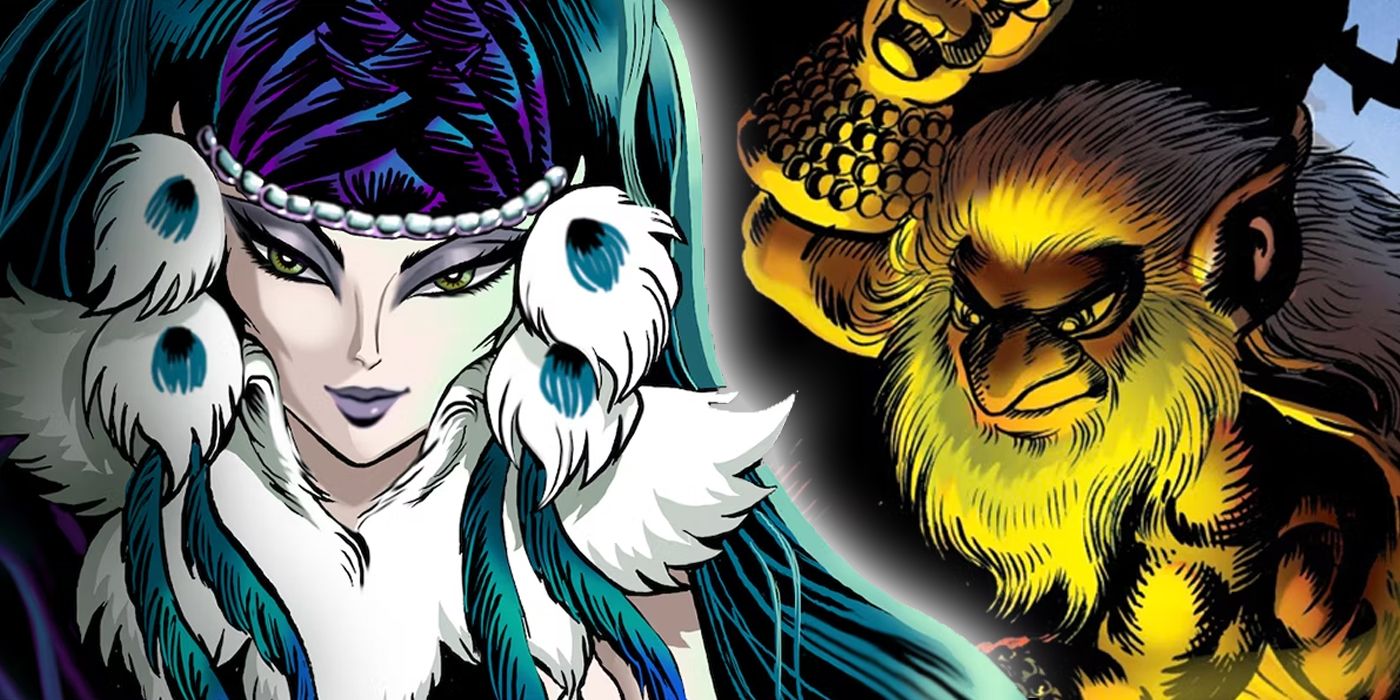
Related
10 Best ElfQuest Villains, Ranked
The upcoming debut of an ElfQuest animated series based on the comic series could feature dark villains like Two-Edge and Winnowill.
I was just wondering. You mentioned Sunny being such a Skywise fan. Is it weird being almost outnumbered?
WP: Oh, two Skywise lovers! [laughs] Well, yeah, but there’s…
RP: There’s only one Skywise. Lots of fans love Skywise. A lot of fans love say he’s their favorite character. And we suspect, and have for years, it’s because of that very footloose and fancy-free nature.
WP: The sidekick is almost always more popular than the hero.
RP: Plus he doesn’t have the responsibilities that the chief has, and all of that kind of thing. Another reason that Stargazer’s Hunt exists is to show that footloose and fancy-free isn’t always the wonderful attractive thing that you think it is.
That great moment when he speaks to Cutter, and essentially asks, “Was I good enough? Did I let you down?” And that’s it. That idea of letting people down constantly is in his mind, right?
WP: Yes, and who hasn’t had someone they’ve loved pass over and who hasn’t said that to their loved one? You know, “Could I have done more?” It’s universal, and I just love what Cutter says. He says, hit, hug – all the same.
A fascinating aspect of Stargazer’s Hunt is what you can do with art all of these decades later. What Sunny can do with Photoshop, it’s got to be mind-blowing for you guys.
RP: Shall I tell on her?
WP: I know what he’s going to say.
RP: For much of its life. ElfQuest was done the traditional way. You know, pencil sketch and then ink, and then it would be sent off to be colored by somebody else on stats. Wendy has always from, I guess, your beginnings as an artist, you have always said that you wanted to paint with light.
WP: I had a fantasy about being able to, I don’t know, wave a brush and have light particles come out of it like a fairy, and just make colors and shapes.
RP: So, from 1978 through the late 1990s anyway, Wendy would draw the traditional way, and then we became a computerized office. And because I was publishing newsletters, I went to the Mac, because the Mac had a page maker, which was an early Page Layout thing. So it became a fully Mac office. At some point, the word “Photoshop” got introduced into my vocabulary. Someone said, “You should have Photoshop.” I don’t know what a Photoshop is, but I’m going to get it. So I put it on on my computer, and I fought with it. I hated it. I couldn’t make it work. I couldn’t do anything on it. I put it on her computer, and using a mouse, inside 15 minutes, she had done this gorgeous, full-color portrait of Winnowill, one of our best characters, using a mouse. And this application that I was hating, I said, “Okay, that’s going to define our creative relationship for the rest of time.” Photoshop is what I’ve come to peace with, but you have graduated
WP: Let me take it from there. Let’s just say I took to it. Now, at that time, and this was the early 2000s, Sonny was working with me in my studio as my apprentice and and already assisting me with the art. And so I took to Photoshop. He would come in and watch me and be amazed. But he said, “Oh no, no, I just want to keep working traditionally. I just can’t, just can’t get with this.” And I kept encouraging him and encouraging him, and finally, he tried it, and he started to acquire his own equipment. And my God, you know, he just absolutely surpassed the teacher.
RP: Oh no, let’s not…
WP: He and I are going to argue about this, but Sonny knows how to do stuff that I’m like, “How did you do that?”
RP: You complement each other. Here’s an example on this double-page spread…
[Note, I don’t actually recall WHICH double-page spread Richard showed, so I just picked this one. It might not be the precise one he was intending to reference, but whatever, it still shows Sonny Strait’s colors – BC]…
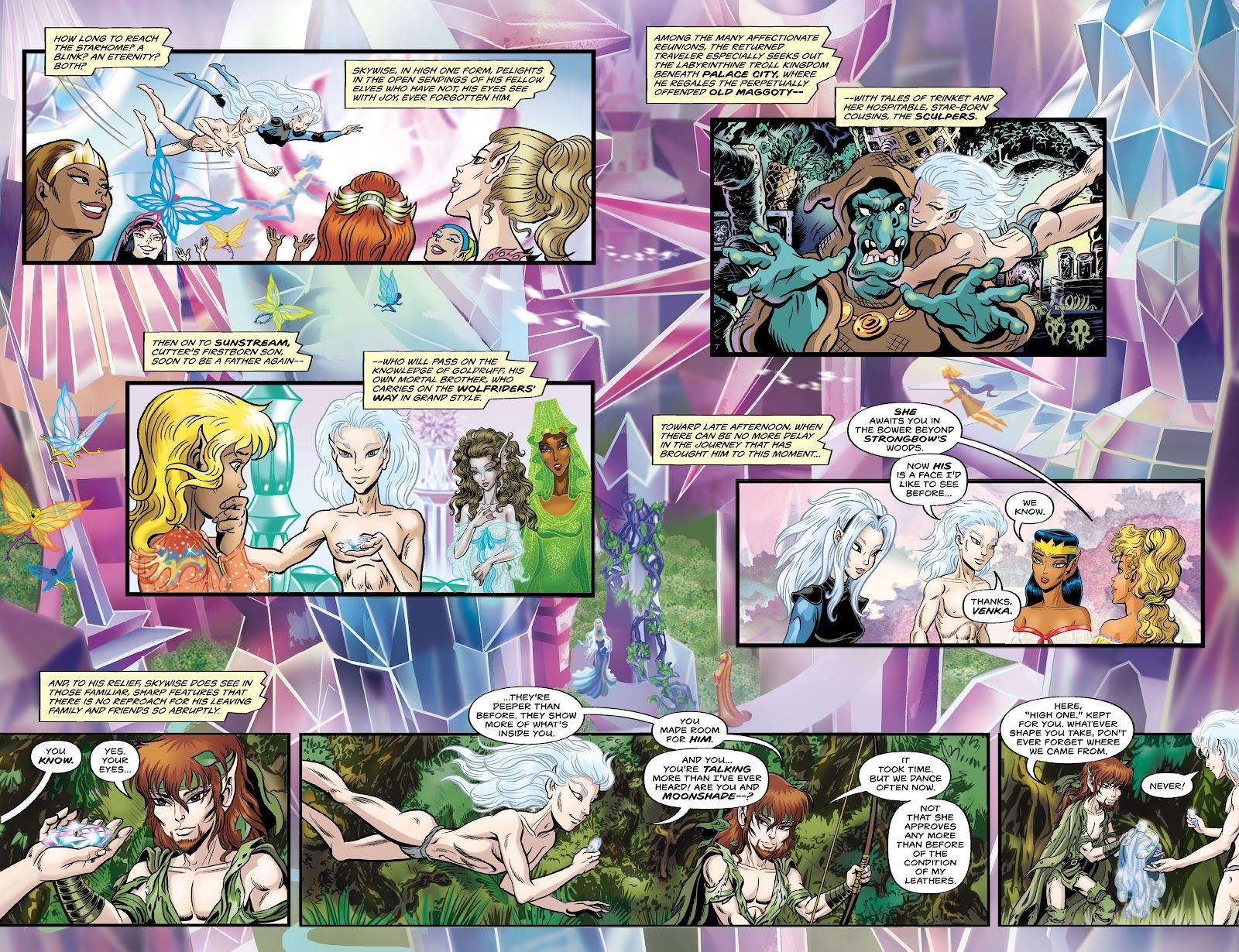
WP: I outlined this, and I did what’s called the color flats for it, which means I simply flatted in colors that had no molding or shading on them at all. This went to sunny and I said to him, I want you to turn this into the most gorgeous, romantic, sloppy anime poster anyone has ever painted. And look what he delivered. I mean, you know, he knew what I was talking about and and there it is.
RP: So it’s been a very beneficial partnership.
WP: Yeah, digital. I love working digitally, and it’s especially kind for deadlines, because sometimes you’re working on a page, and you spill a bottle of ink on it, you’re going to have to start all over again. There’s no rescuing it. You screw up in Photoshop, and Photoshop has this wonderful thing called history. You can go back through it, go to any layer that you were on, and you can recapture and go on from there.
RP: Now, the interesting thing is, having completed Stargazer’s Hunt, and now I’m going to be that tease that we talked about earlier, there are plans and movements afoot at WaRP central here. Wendy is casting her eye on doing more artwork, but going back to national roots,
WP: I have been. I have a workshop. I share a space with Richard in his office, and I have my own workshop, and my drafting table and all the stuff I’ve worked with since I was 16 years old. And I’m going back to these wonderful tools, these brushes and paints and pastels and I’m getting used to the feel of how it is to get my hands dirty again with my art materials, but it’s a kind of desire to go back and see what I can do with more traditional mediums. Because there are certain textures you can bring out with traditional mediums that digital doesn’t quite capture, because digital is meant to be slick. And AI takes that to the nth degree. You’ll never see me involved with that. But, you know, these days, in these cold winter days when we’re going to be kind of housebound, I’m going to be at my drafting table, experimenting with textures and tight detail and things that I haven’t necessarily been able to do quite the same way with digital, and I’m following through with the hints that we put into Stargazer’s Hunt.
One of the cool bits in the collection is that it shows some of the behind the scenes, and some of the looser layouts, and how occasionally, for a more important page, you go tighter. It’s very informative.
WP: Well, thank you.
RP: I love that stuff. As the Archivist for ElfQuest since the beginning, I save every scrap of paper that she puts a mark onto. And there are two reasons for that. One is, I just love having it and looking at it and seeing the evolution of a page, for example, and two, all the art and all of our papers and so on and so forth are going to the archives at Columbia University. So the more I keep, the more we have, and the more students and artists and whoever wants to in the future, if they want to look at the process of ElfQuest, or how Wendy developed as an artist, all of that stuff is going to be available long after we’re not. Let’s just leave it that way. And that is a very peaceful feeling to have.
It’s funny, you mentioned, Wendy, a while back about the idea of ElfQuest, when it started out, how it appealed to the marginalzies groups, like LGBTQ+ readers, and women readers. It’s got to be a fascinating journey for you, Wendy, to go from the early 80s when a female comic book artist was not a novelty, because obviously there had been plenty, but not to that same level. Like, I remember when Colleen Doran was first doing her independent stuff, and how difficult that era was. As Richard notes, there are no guidebooks on how to publish, but there were also no guidebooks on how to be an independent female comic book artist in an era when no one else is doing it. And it’s got to be fascinating to be now, 45 years later, and have a whole generation later, where it’s no longer, “Oh my God, a female comic book artist!”
WP: Well, oddly enough, to some rather backward sorts, there’s still this element of, ” How dare you that?” I will have to say that certain kinds of fanboys haven’t changed since the 70s at all. They are remarkably consistent, but fortunately, I think they’re kind of in the minority and women have found a place in the industry. They’re certainly not dominating the industry, and they still have certain struggles that they go through, and the men have more privileges. We have to acknowledge that it’s still pretty much a man’s industry, but women are standing up for themselves more. They know how to do it better now, and they are helping each other, and they are providing different avenues for expressing their creativity that didn’t exist before. And the internet is an amazing leveler. You know, women are starting up their own websites and putting their independent properties up. They’re launching their ideas online first, and developing an audience that way, then they’re being discovered online, and then they’re getting hired. I mean, this, this is the new journey now, and gender doesn’t quite matter as much as it did.
I love it. I mean, you know, I have to say that MY journey through all of this has been blessed. I, for some reason, have, generally, 90% not had to go through the struggles that a lot of women wanting to break into the industry in the 80s, 90s and onward, have had to go through. Of course, let me point to this source of help and inspiration and facilitation sitting next to me. I had a great partner, a great facilitator, and that’s why you’re interviewing us as “Dynamic Duo.” So my journey was blessed that way. My journey was also blessed, because I had established my reputation as a professional artist 10 years before I got known for comics, and so there wasn’t this constant challenge to me. People had heard of me already. I had that advantage. And even the whole Red Sonia experience led to my first professional work in comics, because doing the traveling show with Frank Thorne and Richard as our special effects person eventually led to Roy Thomas inviting me to write an issue of Red Sonja. And that was my first professional work in comics. So my road through all of this has been kind of blessed.
RP: Well, I was just thinking, as you were talking there, you did build up a reputation in science fiction and fantasy as an illustrator. Of course, you’ve been drawing since the age of two. But there was a little element of you being a rarity in science fiction fandom, as well. There were not that many female science fiction fans, but you, just as you attracted me with the letter in Silver Surfer, you were very talented, and you were a rarity. And there were guys in science fiction fandom who wanted, for whatever motivation, to nurture…
WP: Mostly, to own.
RP: Yeah, to exploit.
WP: Back then they, you know, they wanted a trophy, and they wanted me to fit into certain molds.
RP: A lot of guys were doing fanzines, and a lot of guys wanted one of her illustrations in their fanzines. So she got a lot of requests. And she honed her craft doing that, and that led to bigger and better and so on, all of which funneled into our doing ElfQuest.
WP: But here’s the thing. Here’s where I identify with Skywise, because I’m an escape artist. If I find myself in a situation where I feel that I’m being mishandled or not respected, and that’s been very rare, but occasionally, once in a while…I’m just GONE. And I always had something else to turn to. Like during a period where ElfQuest was optioned by Warner Brothers. This was in 2008 and the option was for four years. And during that period, Warner Brothers kind of disappeared on us. They kind of ghosted us, but they said, don’t publish anything new of ElfQuest during those four years. And instead of getting pissed off and feeling oppressed like, you know, “How dare you!” I went and did another entirely different project. And you know, that filled up the four years, and then ElfQuest came back to us, and we were back on track again. So I’m used to just taking it for granted that if I’m in a situation that isn’t working for me, I can always turn to something else. It’s very hard to tell me no. Richard knows that. That’s been our experience with Hollywood. It’s been our experience working with different publishers in the industry. And it’s all been quite an adventure for me. But I don’t have any gripes…well, not any BIG ones.
What’s interesting is that I guess that happened when DC was doing ElfQuest, right? And just as an outside observer, DC never seemed to quite get ElfQuest the way that Dark Horse has seemed to since you’ve been there.
RP: ElfQuest has has a wonderful resume of partnerships. At the beginning of this interview, we talked about Marvel and DC turning ElfQuest down because it was too peculiar. As soon as the original Quest was wrapped up in 1984, within a year, Marvel had come to us and said, “Can we please have license to reprint?” And I was more than happy to grant that, because one, I love irony, and two, living well is the best revenge. And three, to me, Marvel got ElfQuest onto newsstands.
WP: Sure did.
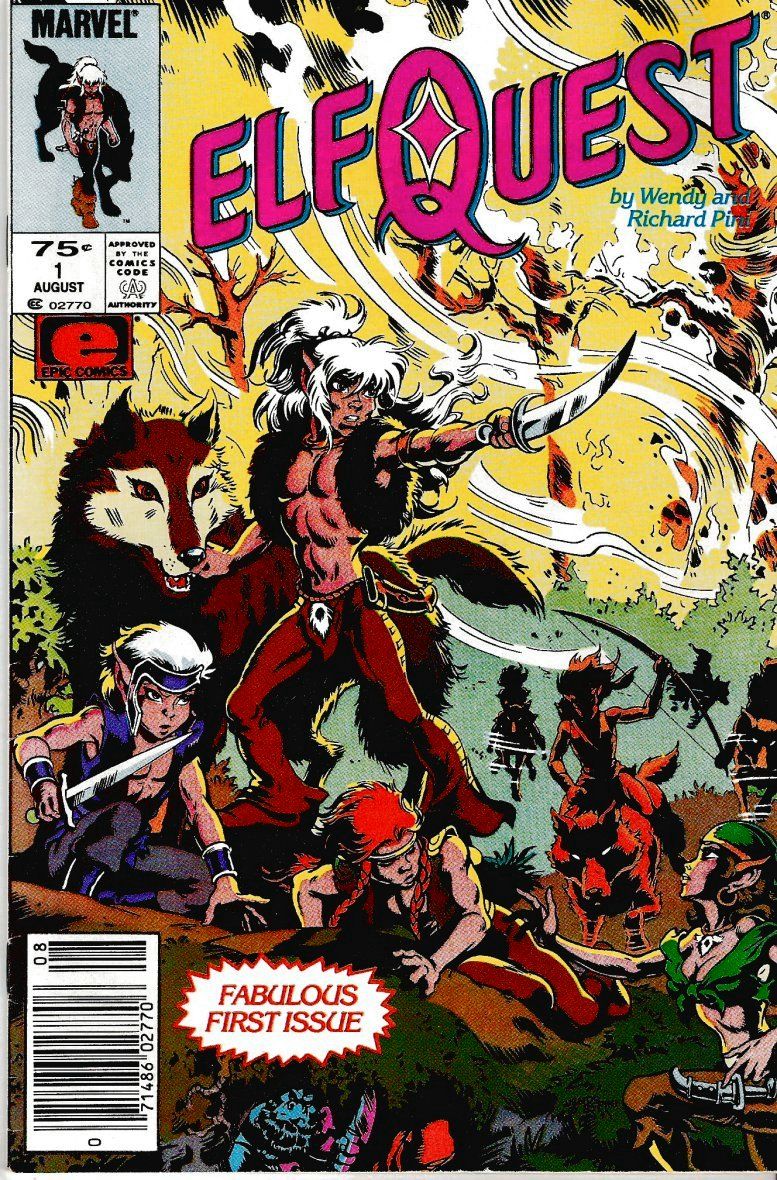
RP: And our audience grew tenfold, and we then continued to do other stories, and in 2003 or thereabouts, DC contacted us and wanted to do both a reprint and an original material license. And I was more than happy to do that, because, just like Marvel, DC has resources that WaRP graphics doesn’t, and never will, just because of the size. So they did a beautiful four-volume reprint of the original Quest, in which Wendy got to digitally paint with light the colors that she had already always envisioned, to do the definitive colors, and they also did some original materials. And then the Warner Brothers hiatus came along, and we did not produce original material for a period of four years. That’s when I put the stuff online. Because in the internet age, if you’re not doing something every day, you get forgotten, you get lost. So I wanted to keep ElfQuest visible, and that’s really why I did all that scanning and uploading. And then, in 2012, Dark Horse came along, and we have been with them ever since. So we’re independent, but we’re not isolationist. If somebody brings something good to the table, that will help get the story out there, and that’s aim number one, getting the story out there, we will sit down at the table and talk with them, and that’s brought us to this day.
It’s funny. We mentioned, obviously, the Warner Brothers situation. One of the CBR writers, Timothy Blake Donohoo, just talked about how ElfQuest would be a perfect TV adaptation.
WP: It was spectacular. We loved that article.
RP: We saw that article. We’re sharing it with everyone. You know, from CBRs pages to Spielberg’s ear or whatever. That was an amazing piece of writing, and we’re very grateful. Please pass along our thanks, oh, yeah, and our gratitude. Yeah, that was, that was a really good piece.
WP: See, we’re always in talks with Hollywood. There’s never a time when Hollywood hasn’t been Knock, knock, knock. You know, we’ve always been in one stage or another of our relationship with Hollywood, and we are to this day, we don’t know where it’s going to go.
RP: Yeah, you know, the ride is fun. Hope springs eternal.
It’s funny, just thinking all the way back to Nelvana.
WP: {scoffs} Brother.
RP: 1981!
And if their film, Rock and Rule, had just worked out, who knows?
RP: They were the first ones to come knocking, and they demonstrated to us what many since have demonstrated to us, which is the ability to say we love ElfQuest, and then to show us that they have…
WP: No idea what it’s about.
RP: And so you gotta keep smiling through that, because otherwise you’ll do damage somehow.
I guess we should wrap things up [My producer had just messaged me that we were nearing two hours, so we should stop. I was prepared to keep going! – BC], and so lastly, we should go back to ElfQuest.com, because besides the comic, that site is PACKED with interesting things for fans.
RP: We have, it may not be the very first, but it is certainly one of the very first top-level domains devoted to a single comic book property. We got ElfQuest.com in the mid 1990s. Somebody who was working for us said, “You really should get this website, ElfQuest.com.” I said, “What’s a website?” I had no clue, but there has been an ElfQuest.com for, well, it’s going to be… what? 30 years next year, and it has undergone four or five renovation and evolutions, and the most recent one is just about a year and a half old. The thing that I am most proud of is what we call the reading room, where you can go right to the homepage, click on a button, go to our library, and then just spend hours and hours reading all the ElfQuest comics up to 2013, but there’s a lot, lot more. There’s a lot of behind the scenes stuff.
WP: Behind the scenes, character designs and character profiles.
RP: There’s a who’s who of hundreds and hundreds of characters. There’s fun stuff, like connections to videos. There are cartoons that Wendy did, there’s tributes and homages. Over the years, ElfQuest has received hat tips or parodies and the only thing I can say is just go to ElfQuest.com and navigate through the top menu bar and the drop-down menus and just sit back and have fun, because we wanted the site to be easy to use, and we wanted it to be fun. And we think we have done that, and it continues to be a source of pride. And I think that’s the best thing about it for me personally, yeah.
WP: Well, it was your baby.
RP: Well, somebody had to do it. Somebody had to publish ElfQuest. So we did it. Oh, and one of the hats I wear iis “tech support.” So I maintain the website as well. Yeah, so we each wear a lot of different hats.
Excellent. Okay, guys, well, thank you so much for coming out and, wow, we covered a lot of great material. Thank you so much.
WP: I think this is going to be one of our favorite interviews, and we want to thank you very much. Especially, I loved the conversation about Stargazer’s Hunt.
Well, thank you for doing it. It was a great book to read.
WP: Thank you.
RP: NOT final.
Yes, NOT final. Thanks again!



